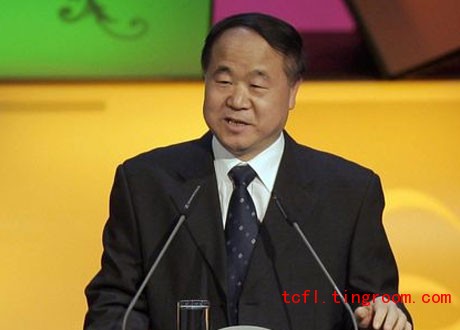
[北京青年报 作者:孔德婧] 1月22日下午,诺贝尔文学奖获奖作家莫言现身自己读硕士的母校——北京师范大学,正式受聘为文学系教授,北师大校长董齐为他颁发了聘书。受聘仪式上,莫言面对五百名“学弟学妹”作了简短的即兴①演讲,笑称自己是“带着泥巴味儿的农民作家”,莫言曾经的导师童庆炳先生评价莫言“是个好学生”。
22日下午4点半,一场“教授聘任仪式”在北京师范大学图书馆的报告厅低调举行。在没有预先通知的情况下,500多名师生将仅有300个座位的会场挤到爆棚②,两条走廊和讲台前的地板也都坐满了人。在欢呼声中,他们的“学长”——诺贝尔文学奖获得者、著名作家莫言,身着墨绿色西装走了进来。
在欣赏完艺术传播学院学生的琵琶、古筝和扬琴的演奏后,北京师范大学校长董奇向莫言颁发了聘书,正式聘任莫言为北师大文学院教授。此外,还赠予莫言一份“意外”的礼物——莫言在校时的相关档案和成绩单。接过成绩单时莫言笑称,“要拿回家自己看,因为里面一定是劣迹斑斑”,引得全场捧腹③。
莫言于1991年毕业于北京师范大学鲁迅文学院创作研究生班,获文艺学硕士学位。在此之前,他就以中篇小说《透明的红萝卜》震动文坛。在即兴演讲中,莫言几乎每说三句话就引发现场的一次笑声,他透露自己“写硕士论文感到困难重重,写了两个月才写了一千字”,最后还是在导师童庆炳的激励④下才得以毕业。
谈到诺贝尔文学奖,莫言称中国有很多作家都比自己有资格获得诺贝尔奖,希望大家对自己的获奖不要小题大做。而对于得奖后的来自外界褒贬不一的评价,莫言表示觉得“自己已经被塑造成一个连自己都陌生的形象”,觉得有点像“妖魔”。别人称赞他是“民族英雄”和“劳动模范”,他也觉得离自己甚远。他说,“一个饱受人评论的人一定是一个比较丰富的人,通过他人的评价我可以看到自己的无数侧面,包括屁股。”
最后,莫言面对台下几百张年轻面孔诚恳地表示,“为什么人写作都可以,就是不能为翻译家写作;什么人都不能忘记,但必须忘记翻译家。”他坦言自己“写作时没有想到传播中国文化,我只想到我自己”,在他眼中,“好的文学不应该是清澈透明的,不应该是有一个准确的答案的,应该有它的丰富性、复杂性,甚至是暧昧性。能让每个人从中读到自己,并随着年龄的变化读出不同的感受来。”
对于此次受聘 担任文学院教授,莫言表示“聘书也是一份重新进入学校学习的通知书”,“会珍惜机会,和学生们互相学习”。在仪式的最后,莫言还为学弟学妹们带来的他的作品一一签了名。一位在文学院读研一的学生说,“他很平易近人⑤,和我想象中的差不多。”
词语解释 Notes to the Words:
① 即兴: adj. spontaneous
② 爆棚: to be packed
③ 捧腹: to be in convulsions of laughter
④ 激励: v. encourage
⑤ 平易近人: (as) common as an old shoe
Mo Yan Appointed as Professor at Alma Mater
Nobel Prize-winning author Mo Yan was officially appointed yesterday a professor of literature at Beijing Normal University, Beijing Youth Daily reports.
Dong Qi, the university president, authorized Mo's letter of appointment.
A very low-profile professorial appointment ceremony was held in the university's library without previous notice. When the event was announced, more than 500 students crowded into the library which only has enough room for 300 people. The library's two corridors and floor in front of the platform were full of students when Mo Yan, dressed in a dark green suit, entered to roaring applause.
At the event, Mo Yan gave a spontaneous speech to 500 students, joking that he was a farmer who wrote "with the flavor of mud."
Dong Bingqing, Mo Yan's tutor, called the award-winning Chinese author a "good student."
After admiring pipa, guzheng and yangqin performances by the students, Dong Qi presented Mo's letter of appointment as a professor in the School of Chinese Language and Literature. Mo also received a surprise gift—his dossier and report from when he studied at the university.
Mo Yan graduated from the university with a master of art's degree in 1991. Before he graduated, his novella "Transparent Red Radish" had already shocked readers.
During his impromptu speech, Mo frequently received laughter and disclosed that when he wrote his master's thesis, he only wrote 1,000 words in two to three months. He added that he graduated thanks to encouragement from his tutor.
Talking about the 2012 Nobel Prize for Literature, Mo said there were other Chinese writers who were entitled to receive the prestigious award and urged people not to overreact to his prize.
As for the positive and negative comments after he received the prize, Mo said he had already been "molded into an image that I couldn't recognize by myself" like a big monster.
Although some have praised him as a national hero or model worker, Mo said he was far from being that good.
"A person who's criticized a lot must be a person with abundant experience," he said. "By reviewing other people's comments about me, I could see countless sides of myself including my hips."
Mo also told the students: "You can write to anyone but a translator. You can't forget anyone but a translator."
He added that when he wrote he did not think about spreading Chinese culture, but rather was writing for himself.
"Good literature must be clear," Mo said. "There shouldn't be a correct answer. Instead, it should be abundant, complex or even ambiguous. It should allow each person to see himself in it, and as time passes, one should have different feelings when reading it."'
As for his new title as professor of literature, Mo said: "The letter of appointment is a notice for me to enter school again. I'll cherish the opportunity and learn along with the students as well as from them."
At the end of the ceremony, Mo autographed copies of his works.
 English
English Japanese
Japanese Korean
Korean French
French German
German Spanish
Spanish Italian
Italian Arab
Arab Portuguese
Portuguese Vietnamese
Vietnamese Russian
Russian Finnish
Finnish Thai
Thai dk
dk